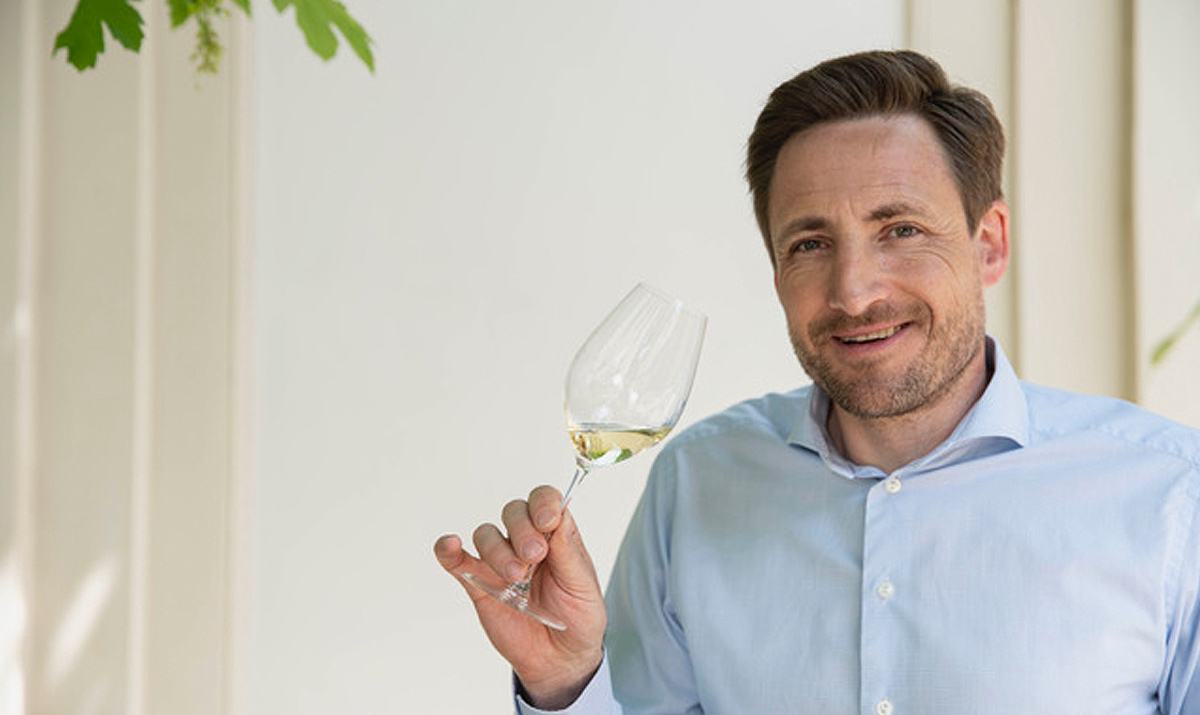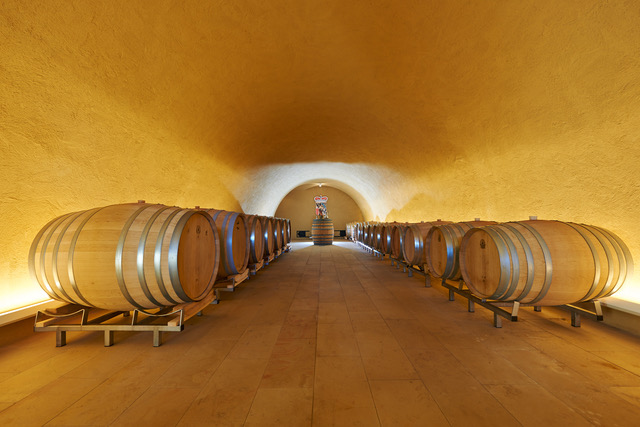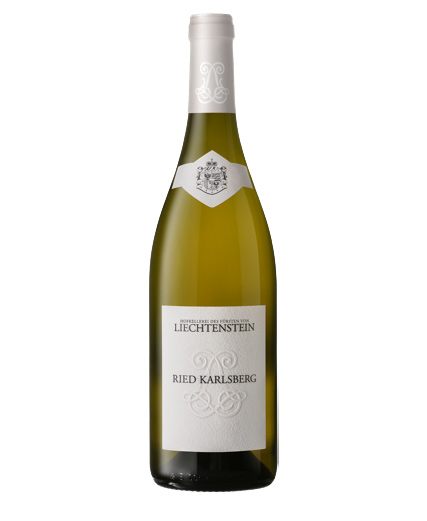
26 Oct Interview with Stefan Tscheppe, General Manager, Princely Wine Cellars of the Prince of Liechtenstein
Can you give us a brief history of the Princely Wine Cellars of the Prince of Liechtenstein?
The winery is one of the oldest companies owned by the Princely family. A few hundred years ago wine was an essential part of compensating workers and everyone at the court, just like firewood for heating or housing. Wine was safer to drink than water in these times since alcohol kept it stable and free of harmful bacteria found in water from wells. The wines are grown in the best-suited locations, with the vineyards situated around the village of Herrnbaumgarten and Schrattenberg just northeast of Vienna. The area has been renowned for producing red and white wines for centuries. Today´s single vineyards of Karlsberg and Johannesbergen were also made for the Princely family and poured at their occasions and festivities. This area was one of the main quality-producing wine locations in the Austrian monarchy. Wines were also shipped and exchanged with other noble families at the time. Our long and rich history serves as an inspiration to the younger generation now working in the vineyards and wineries.
 How does the winery’s luxurious grounds exemplify its ethos and philosophy?
How does the winery’s luxurious grounds exemplify its ethos and philosophy?
The winery in Wilfersdorf, around 40 minutes north of Vienna, is our main wine production facility, with around 78 acres of producing vineyards. It is largely focused on Riesling and Grüner Veltliner blends and some red varietals like Zweigelt and Merlot. All wines ripen in our extensive wine cellars built in 1725, which imbue a certain character only found at the Princely Winery to the style of the wines. A wine shop and vinotheque was built at the Garden Palace in Vienna in 2020 to add representation in the Austrian capital and introduce our wines to audiences visiting from all over the world. The Princely Winery in Vaduz is a single vineyard purchased in 1712. It has produced Pinot Noir for the past 300 years. The Herawingert – with 10 acres densely planted with old French and Swiss Pinot Noir clones – is the centerpiece of winegrowing in the country. Its Pinot Noirs have been rated highly internationally.
What kind of modern transformation has the company undergone since you reorganized operations in 2018?
The pristine single vineyards of the wineries in Austria and Liechtenstein have a lot of potential to produce origin-driven, fresh and long-living wines. It was a matter of convincing a young yet experienced team to farm the vineyards to their full potential and make low-intervention wines that would put both wineries on the map of fine wine in a short time. From 2019 onwards we gained experience with organic and regenerative farming, with the production of our first certified vintage wine in 2024. This transition has changed everything from pruning to canopy work and picking dates to achieve more elegance, more vitality and a sense of place in all our wines. In Vaduz, we had support from Consultants Vignerons, a French consultant group funded by legendary winemaker Stéphane Derenoncourt to ensure the quality and stylistic expression of our Pinot Noirs from the 2019 vintage onwards. Reviews have been favorable from the beginning, and despite the pandemic leaving many wine markets depressed, we built up our international distribution with placements in some of the top restaurants in the USA and Asia. Quantitative growth strategies were abandoned in favor of a quality approach to fine wine. We now produce a smaller number of bottles at a higher average price. All wines are as they were around 30 years ago; we can still taste wines from the 1970s to the early 1990s in our library, which are more handcrafted, true to their origin and unique in their stylistic expression and representation of the vintage. Through this approach and the new energy within the teams, we have attracted a younger customer base and found our way quickly into the fine wine scene in Switzerland and Austria. This year the winery is also a member of the elite group, Österreichische Traditionsweingüter.
 What flagship products is the winery currently focusing on?
What flagship products is the winery currently focusing on?
We are committed to cool-climate, low-intervention, vineyard-driven wines. In Austria, our focus is on Riesling and Grüner Veltliner blends. These wines are unique yet rooted in their regional origin, which has been lauded for hundreds of years. Their aromatic profiles make them some of the most enjoyable fine wines on offer today. From the 2024 vintage onwards they will be certified organic, with gentle farming of these old vines to boost the vitality of all our wines. As for the Pinot Noirs, the 8,000-foot-high Alpspitz mountain makes them truly alpine Pinot Noirs, with great structure, a long, delicate and vivid mouthfeel and lower-than-usual alcohol levels. Our Pinot Noirs are unique, made for Pinot Noir lovers and great on any wine list. They are to be found in the eclectic or substantial Pinot Noir section. The only problem is that they are rare given the Vaduz vineyard’s small size. However, this is much like the small size of our country; it makes them even more exciting for wine lovers to taste.
 How has the company’s branding changed under its recent transformation and the watch of Princess Marie?
How has the company’s branding changed under its recent transformation and the watch of Princess Marie?
Princess Marie has been the family member most heavily involved in the winery over the past 10 years. She has tastefully created many of the labels, some even with her handwriting on them. She has introduced our wines in Asia, Austria and Liechtenstein. The wineries´ branding has become more elegant and distinct, with haptic packaging choices that better reflect our current fine wine offerings. In marketing, the wines being a Princely winery owned by the family is very important. Today around 10% of the production goes to the Princely family and their companies. The wines are beloved gifts offered at events, which has led to increasing demand amongst business partners. Today the wines are offered in small quantities in the Asian market and the USA with small fine wine importers in California, New York and Oregon. Our importer ships to consumers across the USA from Oregon. Our exported portfolio focuses solely on signature wines such as our single vineyard blends and Pinot Noir.
What is the company doing to lower its carbon footprint and use more ecological-focused practices in the making and selling of its wines?
The wineries are certified organic from the 2024 vintage onwards. We farm regeneratively, with a strong focus on healthy soils. We use deep-rooting cover crops, no irrigation and organic supplements only where needed. No herbicides or pesticides are used. The Austrian winery is solar-powered and uses recycling sprays. We engage in careful fungal disease monitoring and manual preventive practices such as de-leafing to reduce tractor hours. We aim to be a positive role model for other wineries working in our region and very open to sharing our successes in sustainable farming and production. We use non-coated carton cases for our packaging and avoid waste wherever possible. The teams at the wineries live close to the wineries and do not have long commutes. We sell most of our wines locally within a short distance in Austria and Liechtenstein. However, it is crucial that we establish the brand in foreign markets to help raise the value of the wines in our home markets. This will allow us to keep farming sustainably and invest extra hours in the quality and health of our vineyards. Our approach to running the wineries is wholesome, but there is always room for improvement. We are constantly working to improve our processes.
What are your top three priorities and long-term vision as general manager of the Princely Wine Cellars of the Prince of Liechtenstein?
Together with our teams, we want to establish the Princely Wine Cellars of the Prince of Liechtenstein among the top range of producers in the categories of Pinot Noir and white-origin wines. We aim to be followed by wine lovers around the world, with international placements in great restaurants. Our wines should be enjoyable and ambassadors of their regions in Austria and Liechtenstein. Despite 2024 being a difficult vintage for most producers in the alpine Rhine valley and Austria, our vineyards have thrived. We have produced some of our top wines in the last few years. We want to continue our approach towards vineyard-driven, low-intervention wines by ever so slightly refining our approaches to establish our unique style – a combination of delicacy, structure and freshness. My top priorities in 2024 are to continue supporting the teams at our wineries, work closely with our distribution partners to get them behind our brand and – of course – work towards a wonderful vintage in 2025.
